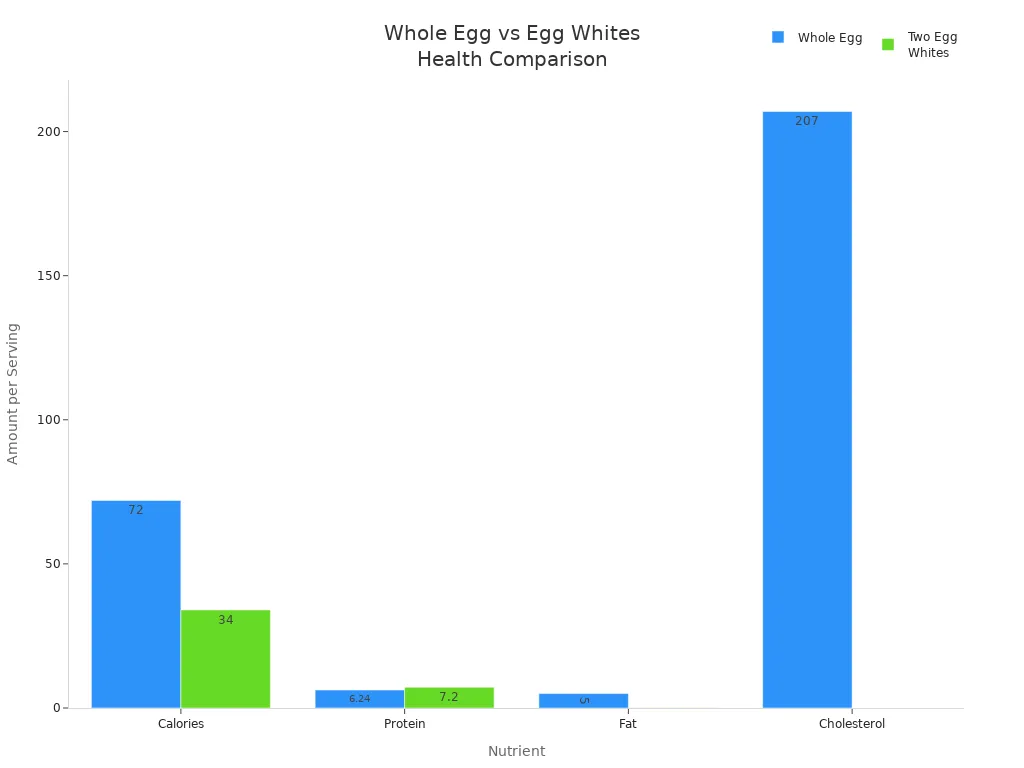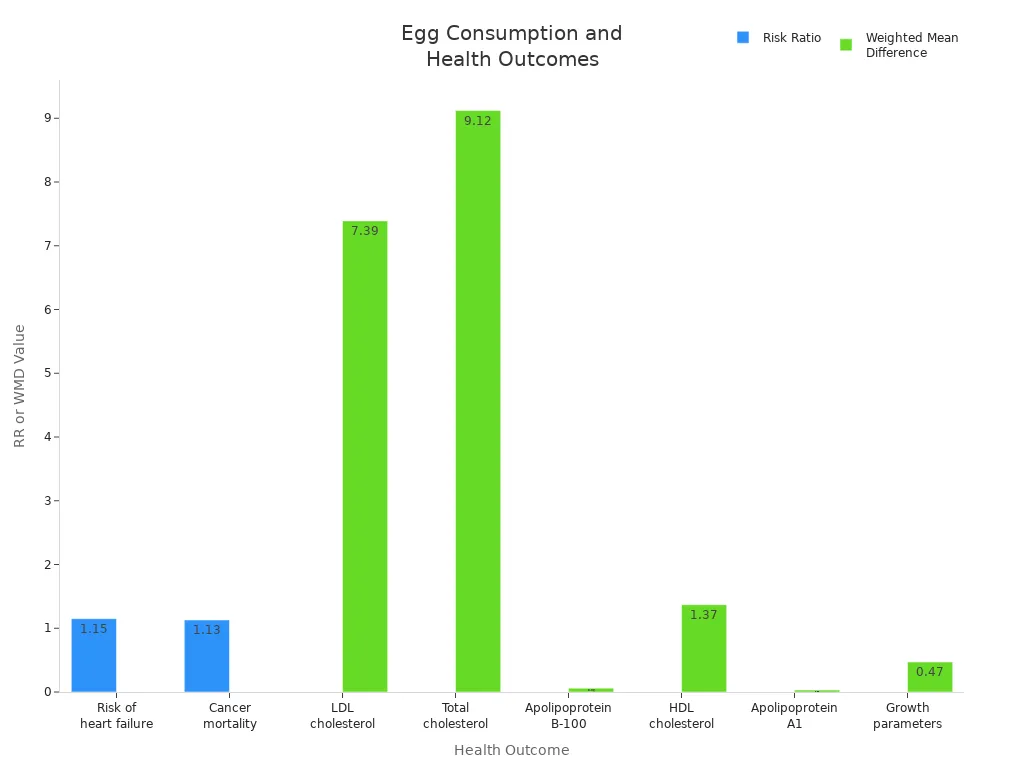
Do you ever wonder if you should pick egg whites or whole eggs for better health, fitness, or weight loss? Studies show that both can fit into a healthy diet, but the right choice depends on your goals. Many people still believe eggs raise cholesterol and cause heart disease, but new research proves otherwise. Take a look at this table to see how they compare:
Whole Egg | Two Egg Whites |
|---|---|
Calories | 72 |
Protein | 6.24 g |
Fat | 5 g |
Cholesterol | 207 mg |

Egg Whites vs Whole Eggs is not just about nutrition; it is about what fits your needs best.
Key Takeaways
Whole eggs provide a richer nutritional profile, offering essential vitamins and minerals that support overall health.
Egg whites are low in calories and fat, making them a great option for weight loss and high-protein diets.
For muscle building, whole eggs are more effective than egg whites due to their complete nutrient content.
Eating one to two whole eggs daily can be part of a healthy diet without raising cholesterol levels for most people.
Consider your personal health goals when choosing between egg whites and whole eggs to maximize nutritional benefits.
Which One Is Healthier?
Expert Consensus
When you ask which one is healthier, experts look at the big picture. Recent studies compare egg whites vs whole eggs and show that whole eggs offer a richer nutritional profile. Whole eggs contain all the nutrients needed for the growth of a chick, with most vitamins and minerals found in the yolk. You get more than just protein when you eat whole eggs.
Evidence Type | Findings |
|---|---|
Nutritional Profile | Whole eggs provide all the nutrients necessary for the development of an animal, with most beneficial nutrients found in the yolk. |
Cardiovascular Health | A 2020 meta-analysis found no link between one whole egg per day and increased cardiovascular disease risk, suggesting potential heart disease risk reduction in certain populations. |
Cholesterol Levels | Studies indicate that healthy individuals can consume 1-2 eggs daily without negative effects on cholesterol or heart disease risk. |
Weight Management | Whole eggs promote greater satiety, which can help in managing weight by lowering overall calorie intake. |
Nutritional Benefits | Whole eggs are nutrient-dense, supporting eye health, brain function, and muscle building. |
Nutrition organizations also weigh in on which one is healthier.
The American Heart Association does not mention limiting egg consumption, but they do recommend eating lean poultry and nutritious food. As far as we know, eggs are nutritious.
You might wonder about stroke risk.
A 2016 study published in the Journal of the American College of Nutrition found that people who eat an average of one egg a day had a 12 percent lower stroke risk than those who ate fewer eggs.
Muscle building is another area where egg whites vs whole eggs matter.
In a study conducted by the University Of Illinois at Urbana – Champaign, whole eggs were found to be better for muscle building and repair than egg whites alone. Study subjects eating whole eggs after resistance exercise boosted muscle building and repair significantly more than those subjects eating egg whites with an equivalent amount of protein.
Whole eggs also deliver more vitamins and minerals.
Whole eggs contain essential vitamins and minerals, including more than 50% of the protein and 90% of the calcium, iron, phosphorus, zinc, thiamin, B6, folate, and B12.
The yolks also provide all of the fat-soluble vitamins A, D, E, and K.
When you compare egg whites vs whole eggs, you see that whole eggs give you more nutrients and may even help lower stroke risk. Most experts agree that for healthy people, whole eggs are a nutritious choice.
Individual Factors
You need to think about your own health when deciding which one is healthier. Medical professionals look at your goals, medical history, and dietary needs before making a recommendation. For some people, egg whites vs whole eggs is not just about nutrition but about managing health risks.
Recent studies show that dietary cholesterol does not raise blood cholesterol for most people. Only those with certain genetic conditions need to worry. A meta-analysis from 2020 found that eating one whole egg daily does not increase heart disease risk and may even lower it in some groups.
Your diet plan matters.
Dietary Consideration | Recommendation |
|---|---|
Low-calorie diets | Egg whites are beneficial for reducing calories while increasing protein intake. |
High-protein diets for muscle gain | Whole eggs are more effective for muscle building, but egg whites can help meet protein targets with less fat. |
General balanced diet | One to two whole eggs daily can be nutritious. |
Low-cholesterol diets | Egg whites are preferable to avoid cholesterol intake. |
You should also consider your health conditions.
Health Condition | Impact on Egg Choice | Recommendations |
|---|---|---|
Diabetes | High cholesterol levels are common; dietary cholesterol has less impact than saturated fats. | Eggs can be included in moderation, focusing on low saturated fat intake. |
High Cholesterol | Managing cholesterol is crucial; dietary cholesterol is less significant than saturated fats. | Limit saturated fats; eggs are nutrient-dense and can be part of a balanced diet. |
If you have high cholesterol or diabetes, you may need to limit egg yolks.
Those with high cholesterol should limit dietary cholesterol and saturated fat, opting for egg whites.
Individuals with diabetes, high cholesterol, or heart failure should limit egg yolks to two to three per week.
When you look at health outcomes, whole eggs lead to higher intake of nutrients like choline, vitamin B12, and vitamin D. People who eat whole eggs show better metabolic profiles, which may protect against type 2 diabetes. Egg white diets do not offer the same benefits and may result in minor weight gain without improving muscle or fat mass.
So, when you ask which one is healthier, you need to think about your own health goals and conditions. Egg whites vs whole eggs is not a one-size-fits-all answer. You should choose based on your needs, whether you want more nutrients, lower calories, or better muscle building.
Egg Whites vs Whole Eggs: Nutrition

When you look at egg whites and whole eggs, you see clear nutritional differences. Each part of the egg offers unique nutrients and benefits. Understanding the nutritional breakdown helps you make the best choice for your diet.
Calories and Protein
Egg whites and whole eggs both provide high quality protein, but the amount and calorie content differ. If you want to know what the numbers look like, check out this table:
Nutrient | Egg White | Whole Egg |
|---|---|---|
Calories | 17.2 kcal | 71.5 kcal |
Protein | 3.6 grams | 6.3 grams |
Egg whites contain most of the protein in an egg. You get about 3.6 grams of protein from one egg white, while a whole egg gives you 6.3 grams. The protein-to-calorie ratio is higher in egg whites, which means you get more protein for fewer calories. This makes egg white nutrition a popular choice for people who want high protein without extra calories.
Tip: If you want to boost your protein intake without adding much fat or calories, egg whites can help you reach your goals.
Whole eggs provide more protein per serving, but they also come with more calories. The extra calories come from the yolk, which holds most of the nutrients. If you want a high protein meal with fewer calories, egg whites offer clear benefits. If you want a more complete nutritional profile, whole eggs give you more than just protein.
Fat and Cholesterol
Fat and cholesterol are two areas where egg whites and whole eggs show big differences. Here is a quick comparison:
Nutrient | Whole Egg | Egg White |
|---|---|---|
Fat (total lipids) | 4.76 g | 0.056 g |
Cholesterol | Present in yolk | None in egg whites |
Egg whites have almost no fat and zero cholesterol. This makes them a good option if you want to avoid these nutrients. Whole eggs, on the other hand, contain about 4.76 grams of fat and all the cholesterol found in the egg. The cholesterol sits in the yolk, so when you eat only the white, you skip this part.
Egg white contain most of the protein, but egg yolks contain most of the nutrients, including healthy fats and cholesterol. Many people worry about cholesterol in eggs, but recent research shows that eating whole eggs does not raise cholesterol for most people. If you need to limit fat or cholesterol, egg whites can fit your needs.
Vitamins and Minerals
The biggest nutritional differences between egg whites and whole eggs show up in their vitamin and mineral content. Whole eggs stand out as a powerhouse of nutrients. Take a look at this table to see what you get from each part:
Nutrient | Egg White | Whole Egg |
|---|---|---|
Calories | 18 | 74 |
Protein | 3.6 g | 6.2 g |
Fat | 0 g | 5 g |
Cholesterol | 0% | 69% |
Vitamin A | 0% | 10% |
Vitamin B12 | 0% | 21% |
Vitamin B2 | 11% | 16% |
Vitamin D | 0% | 8% |
Choline | 0% | 31% |
Selenium | 8% | 28% |
Whole eggs give you much more vitamin A, vitamin D, vitamin B12, choline, and selenium. Egg yolks contain most of the nutrients, while egg whites provide only a small amount of vitamins and minerals. If you want to get the full nutritional value from your egg, you need to eat the whole egg.
Here is a list of nutrients that are much higher in whole eggs compared to egg whites:
Vitamin A
Vitamin D
Vitamin E
Vitamin K
Vitamin B9 (Folate)
Vitamin B12
Iron
Phosphorus
Calcium
Selenium
Choline
Zinc
Copper
Manganese
Egg white benefits include being low in calories, fat, and cholesterol, but they do not offer the same range of nutrients as whole eggs. If you want a food rich in vitamins and minerals, whole eggs are the better choice. Egg white contain most of the protein, but egg yolks contain most of the nutrients.
Note: The nutritional profile of whole eggs supports eye health, brain function, and muscle growth. Egg whites focus on high protein with fewer calories.
When you compare egg whites vs whole eggs, you see that each has its own strengths. Egg whites shine for high protein and low calories. Whole eggs deliver a complete nutritional profile with many essential nutrients. Knowing these nutritional differences helps you decide what fits your needs best.
Health Benefits and Risks
Heart Health
Eggs have a long history of debate when it comes to heart health. You may hear that dietary cholesterol in eggs raises your risk of heart disease. Some research shows a link between higher cholesterol content in your diet and increased risk.
Norrina Allen’s research indicates that for every 300 milligrams of dietary cholesterol consumed, there is a 17 percent higher risk of incident cardiovascular disease and an 18 percent higher risk of all-cause death. The study specifically highlights that cholesterol from eggs is a significant factor in this relationship, suggesting that higher egg consumption correlates with increased heart disease risk.
However, other studies show that your overall diet matters more than just the number of eggs you eat. The effect of eggs on LDL cholesterol depends on what else you eat.
Diet Type | LDL Cholesterol Effect |
|---|---|
High-saturated fat diet (1 egg/wk) | Raises LDL cholesterol levels |
Low-saturated fat diet (2 eggs/day) | Lowers LDL cholesterol levels compared to high-saturated fat diet |
Eggs can fit into a heart-healthy diet if you keep saturated fat low. The health benefits of eggs depend on your whole eating pattern.
Muscle Building
Eggs are famous for building muscles. Both egg whites and whole eggs offer high protein, but whole eggs provide more beneficial nutrients.
A study involving resistance-trained men showed that both whole eggs and egg whites triggered muscle protein synthesis after exercise.
Whole eggs resulted in a significantly greater increase in muscle protein synthesis compared to egg whites, despite both containing the same amount of protein.
The enhanced response from whole eggs is attributed to their unique nutrient matrix, which includes fats, vitamins, and minerals, rather than just the protein content.
Whole Eggs | Egg Whites |
|---|---|
High in protein and nutrients | High in protein but lacks some nutrients |
Supports muscle growth and recovery | Supports protein intake but less effective for muscle synthesis |
“The widespread practice of throwing away egg yolks to maximize one’s dietary protein intake from eggs is counterproductive.” – Dr. Nicholas Burd
Whole eggs support optimal nutrition for muscle growth and recovery.
Allergies
Egg allergy is one of the most common food allergies in children. Most cases appear in young children, but the rates are still low.
Overall prevalence of egg allergy among children is 0.9%.
Prevalence among children under 5 years is 1.3%.
A meta-analysis indicates that egg allergy affects 0.5% to 2.5% of young children.
In 3-year-old Danish children, the prevalence was 1.6%.
The study found that patients with egg yolk allergies experienced significantly fewer respiratory symptoms and more gastrointestinal symptoms compared to those with egg white allergies. This indicates a clear difference in the allergic reactions triggered by egg whites versus whole eggs.
Nutrient Deficiency
If you eat only egg whites, you miss out on many beneficial nutrients found in the yolk. This can lead to nutrient deficiencies, especially if eggs are a main part of your diet. Whole eggs provide optimal nutrition because they contain vitamins and minerals that egg whites lack.
Nutrient | Benefit |
|---|---|
Choline | Aids in brain function, nervous system health, and cell membrane integrity. |
Vitamin D | Promotes mineral absorption, builds strong bones and teeth, and helps prevent osteoporosis. |
Vitamin B12 | Essential for cell health, prevents heart disease, and maintains energy levels. |
Selenium | Supports bone health, energy metabolism, and immune system function. |
Folate | Helps build healthy red blood cells and prevents anemia. |
Egg yolks supply these beneficial nutrients, making them important for optimal nutrition and overall health benefits.
Practical Tips for Your Diet

Choosing Egg Whites
You may want to choose egg whites if you have specific health goals. Egg whites work well for people who want to lose weight or follow a high protein diet with low calories. You get about 4 grams of protein and only 17 calories from one egg white. There is no fat or cholesterol, so egg whites are a lean source of protein.
Egg whites help you keep calorie intake low.
They provide satisfying protein for weight loss.
People with cardiovascular risk factors can eat egg whites without increasing their risk. Studies show no link between egg white consumption and heart disease.
Egg whites fit into many meal plans. You can add them to omelets, scrambles, or smoothies for extra protein.
Choosing Whole Eggs
Whole eggs offer more nutrition and benefits than egg whites alone. You get complete protein, healthy fats, and important vitamins and minerals. Nutrition experts say that eggs improve your cholesterol profile and do not raise your risk of heart disease. They raise HDL cholesterol and increase the size of LDL particles, which may lower heart disease risk.
Eggs improve your cholesterol profile and do NOT raise your risk of heart disease. They raise HDL (good) cholesterol and increase the size of LDL particles, which should lower the risk of heart disease.
Whole eggs provide lutein and zeaxanthin for cognitive function. You get choline for brain development and mood. Eating eggs helps conserve lean mass and prevent muscle loss when you exercise. Eggs are also a low-cost source of high-quality protein and micronutrients.
Study Type | Findings on BMI | Findings on Satiety | Notes |
|---|---|---|---|
Meta-analysis | Decreased BMI | Increased satiety | Eggs help with weight management in energy-restricted diets |
Clinical Trial | Weight loss | Not specified | Eggs for breakfast led to more weight loss than bagels |
Balanced Egg Intake
You can combine egg whites and whole eggs for complete nutrition. Mixing both lets you enjoy high protein and get essential nutrients from the yolk. Try using one whole egg with extra egg whites in recipes. This method boosts protein while keeping calories and cholesterol lower.
Age Group | Recommended Frequency |
|---|---|
Most Healthy Adults | 1-2 eggs daily |
General Recommendation | 4-5 eggs per week |
Eggs fit into a balanced diet. You can include them in breakfast, lunch, or dinner. They support muscle health, brain function, and overall wellness.
You can choose egg whites or whole eggs based on your health goals. Whole eggs give you more nutrients and support muscle growth, while egg whites offer high protein with fewer calories. Studies show that eating eggs regularly may lower your risk of diabetes and high blood pressure.

Option | Best For |
|---|---|
Whole Eggs | Muscle growth, nutrient intake |
Egg Whites | Low-calorie, high-protein diets |
Making informed choices helps you get the most health benefits from eggs. Always match your egg choice to your personal needs and preferences.
FAQ
What nutrients do you miss if you eat only egg whites?
You miss vitamin D, vitamin B12, choline, iron, and healthy fats. These nutrients help your brain, bones, and muscles stay strong. The yolk contains most of these important nutrients.
What makes egg whites a good choice for weight loss?
Egg whites give you high protein with very few calories. You feel full after eating them. You can add them to meals without adding fat or cholesterol.
What is the recommended number of eggs you should eat each week?
Most healthy adults can eat 4–7 eggs per week. You can choose whole eggs or mix them with egg whites. Always match your intake to your health goals.
What should you do if you have high cholesterol?
You should talk to your doctor before changing your diet. Many people with high cholesterol can eat eggs in moderation. Egg whites are a safe choice because they have no cholesterol.
What are the signs of an egg allergy?
You may notice skin rashes, stomach pain, or trouble breathing after eating eggs. If you see these signs, you should stop eating eggs and talk to your doctor.

